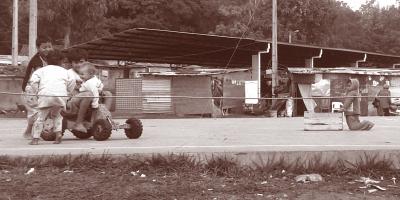
Earlier this year, climate justice advocate and former UN official Mary Robinson told IDLO that climate change exacerbated vulnerability and made access to justice even harder.
The truth of her words stares you in the face as you drive through the streets of Asunción.
Unbeknownst to most of the world, the Paraguayan capital is living through a serious crisis, after the Paraguay river burst its banks. Pavements, parks, military training grounds, a disused railway line: every available space is crammed with makeshift plywood and corrugated iron ‘houses’ – little more than cardboard boxes - where thousands of families have sought shelter after floods forced them out of their homes in the city’s poorest areas. Clothes hang on lines. Children play in the mud. Dogs, chickens and pigs rummage for food. While some flooding occurs every year, it has been decades since it last happened on this scale. Experts blame it on El Niño.
One of the submerged neighborhoods is Bañado Tacumbú, where IDLO – as part of its access-to-justice work under the EUROsociAL II Program – has been supporting a legal orientation service offered by the Paraguayan Ministry of Justice and the private Universidad Americana.
The idea behind the initiative – a pilot around which a more structured service will be developed and replicated – is to provide residents of low-income areas with free legal advice to help solve their manifold problems. These range from disputes over land tenure to complaints about neighbors’ behavior, from issues around alimony to cases of domestic violence.
“We are the legal equivalent of a first aid service,” explains Professor Gabina Gavilán, who has coordinated the service since its inception. “Not all issues can find an immediate solution, but we can advise people, help them with legal procedures and provide conflict mediation.”
Because of the weather, the service was suspended for several weeks. It resumes on a sunny Saturday morning in new premises: a warehouse-style building of thin wood panels and a zinc roof, in the middle of a military base now taken over by refugee families. Two teams of lawyers gather at rickety tables, sitting on plastic garden chairs. It might sound precarious, but it’s right at the heart of where it’s most needed. Soon, led by the energetic Sandra, a lawyer and professor, the teams fan out. They brave muddy alleyways, stopping at corner shops and on doorsteps, chatting with locals in jopará, the distinctive mixture of Spanish and guaraní spoken in the community.
Ana is among the first clients of the day. She stands in front of her house crushing herbs in a mortar – she sells these and other vegetables for a living. When the lawyers mention they can help get estranged fathers to comply with their parental duties, her face lights up: the fathers of her two children are not supporting them and she finds it hard to cope.
A little further down the road, a couple are chopping meat in their open-air shop. They say they have trouble with their neighbor – in the wretched and crowded conditions of the camp, tensions fly high and minor controversies escalate quickly, this time into death threats. The couple are happy to take up the offer of mediation and set a date for next Saturday.
By the end of the neighborhood tour, it is clear that the service is much needed. People in the Bañado and similar communities have little if any knowledge of their rights. Even if they did, they lack the resources to start and follow up on proceedings. Legal fees are prohibitive. Even the bus fare to the center of town – to a government office or the courts – is often out of reach.“It’s so great this is free,” says Clara, who turns up with four different questions. “Normally when you speak to a lawyer, they charge you even to say ‘good morning’.”
In endeavoring to bring justice closer to marginalized communities, Paraguay is following in the footsteps of other countries in the region. IDLO is currently working in seven of these nations (Argentina, Brazil, Chile, Costa Rica, Honduras, Paraguay and Peru, as well as Paraguay itself), providing legal expertise and supporting communication campaigns to improve access to rights.

